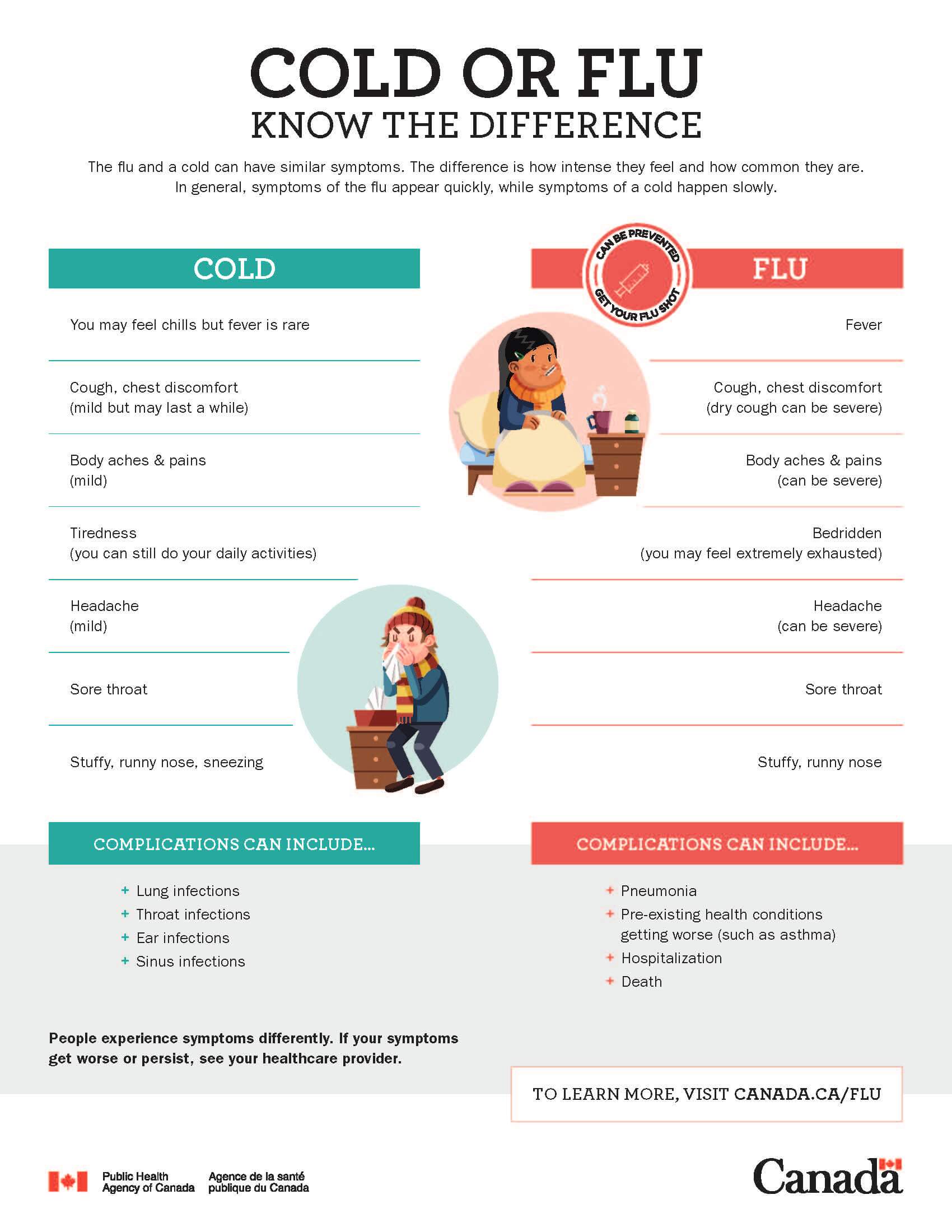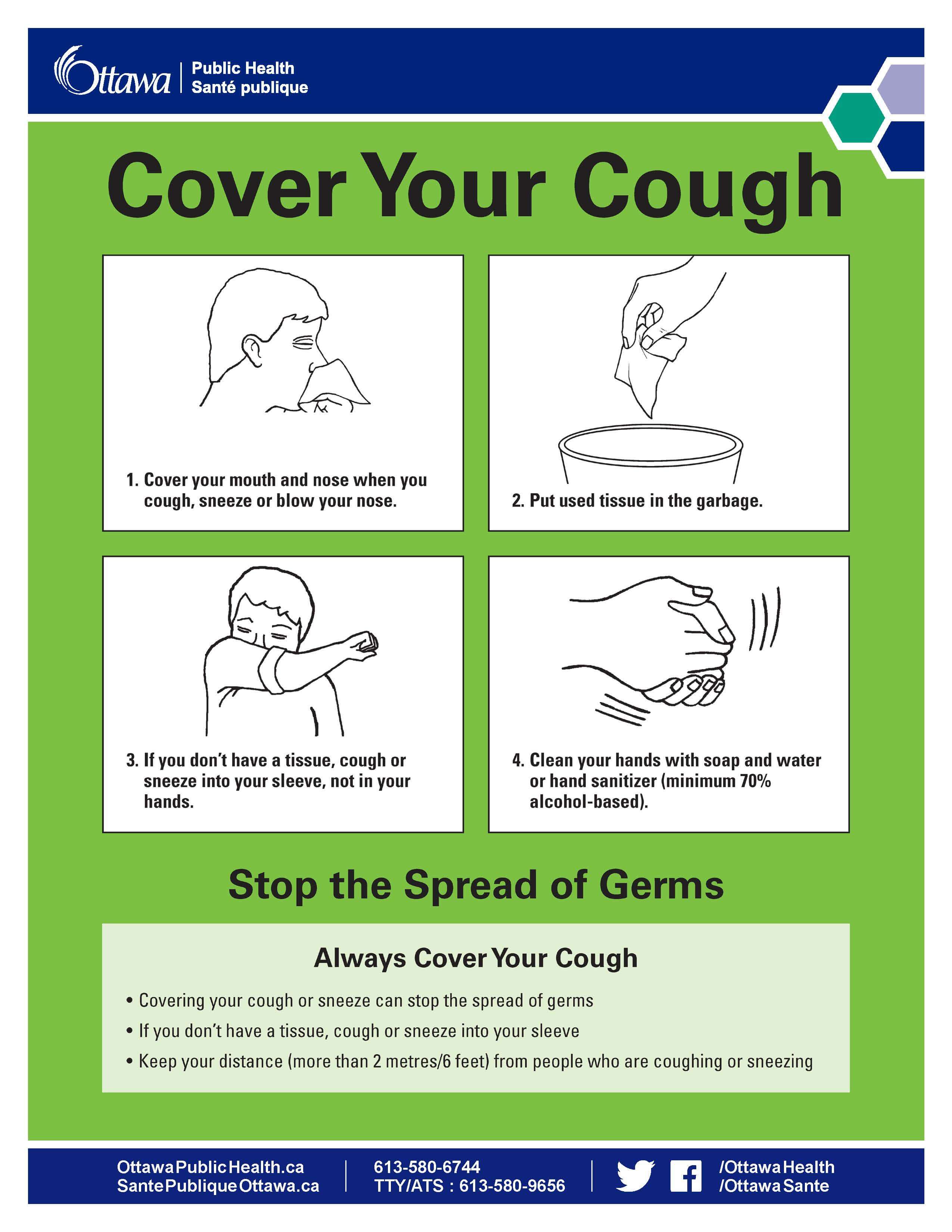Cold and Flu
Don’t let colds and flu get you down! On this page, you’ll find:
- The differences between cold and flu symptoms
- Tips on proper hand hygiene, antibiotic use, and saltwater gargles for sore throats
- Additional cold and flu resources
If you think you have a cold or flu, should you come to Health Services?
If you are experiencing cold or flu symptoms, the first step is to call Health Services at 613.727.4723 ext. 7222. Our clinic remains closed to walk-ins at this time, so calling us is your first step. A health professional will discuss your case over the phone and determine next steps that will meet your care needs.
Cold vs. Flu
There are similarities in cold and flu symptoms, but there are some differences regarding the intensity of the symptoms and how common they are. The following chart could help to differentiate between them:
The flu can spread easily and quickly; you may also transfer it to others before you know you are sick. Please stay at home if you are sick and do not come to the campus.
The following measures will help to prevent spread of germs:
- Wash your hands with soap and water, or use hand sanitizer
- Cover your coughs and sneezes with a tissue or your arm, not your hand
- Stay at home if you are sick
- Get immunized
If you think you have a cold or flu, should you come to Health Services?
If you are experiencing cold or flu symptoms, the first step is to call Health Services at 613.727.4723 ext. 7222. Our clinic remains closed to walk-ins at this time, so calling us is your first step. A health professional will discuss your case over the phone and determine next steps that will meet your care needs.
Hand Hygiene
When performed correctly, hand hygiene is the single most effective way to prevent the spread of communicable diseases and infections.
Check out this chart from Ottawa Public Health for the proper handwashing technique.
Cough and Sneeze Etiquette
Germs such as influenza, cold viruses, and even whooping cough are spread by coughing or sneezing. When you cough or sneeze on your hands, your hands carry and spread these germs. So, what’s the best way to prevent this?
- Cover your mouth and nose with a tissue when you cough or sneeze. Put your used tissue in the garbage.
- If you don’t have a tissue, cough or sneeze into your upper sleeve or elbow, not your hands.
- Wash your hands often with soap and warm water for 15 seconds. If soap and water is not available, use an alcohol-based hand sanitizer (minimum 70% alcohol-based).
- For more on this and other healthy habits recommended by Ottawa Public health, visit their Stop the Spread of Germs webpage.
Antibiotic Use and Antibiotic Resistance
Using antibiotics wisely is an important element of public health in areas all over the world. Antibiotics are medications used to kill bacteria, not viruses. If you have a viral infection, antibiotics do not help in killing the virus and they will not help you feel better.
Each time you take or give your child an antibiotic unnecessarily or improperly, you increase the chance of developing medicine-resistant bacteria. Therefore, it is critically important to take antibiotics only when necessary. Because of these resistant bacteria, some diseases that used to be easy to treat are now becoming nearly impossible to treat.
If you think you have a cold or flu, should you come to Health Services?
If you are experiencing cold or flu symptoms, the first step is to call Health Services at 613.727.4723 ext. 7222. Our clinic remains closed to walk-ins at this time, so calling us is your first step. A health professional will discuss your case over the phone and determine next steps that will meet your care needs.
Based on symptoms and other medical care measures, you will be diagnosed. An antibiotic will be prescribed only if you have a bacterial infection and if a doctor deems it necessary to prescribe. If you have a viral infection, an antibiotic will not be prescribed. Instead, you should rest, stay at home while you’re ill, and follow any advice the doctor gives you.
If you have sore throat, please use mouth gargles. Read more about this in the point below.
Mouth Gargle for Sore Throat
A salt water gargle can help soothe your sore throat. Follow the steps below for the proper technique.
Flu Shots
Health Services offers medical care and other services, including Flu Shot Clinics during flu season. Each year during flu season, Health Services sets up specific days to provide flu shots for Algonquin College students and employees.
Algonquin College’s Health Services has been working closely with Risk Management and Ottawa Public Health to finalize plans to provide flu shots this Fall. In keeping with College direction to minimize traffic on campus, we will be offering flu shots to all students and employees who are approved to be on campus for work and/or study as well as to all students living in Residence.
For dates and updates, check out the Flu Vaccination Clinic webpage.
Flu shots help protect you if you are exposed to the virus, preventing you from getting sick and protecting others around you. Learn more about more about the effectiveness and safety of flu shots.
Additional Cold and Flu Resources
College Resources:
Other Helpful Resources:

